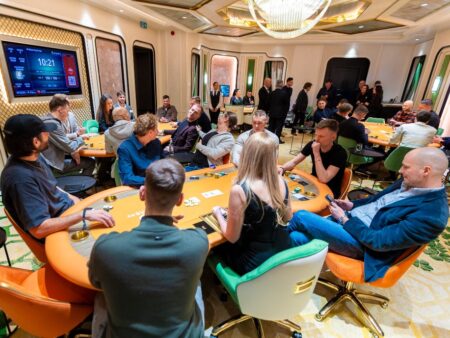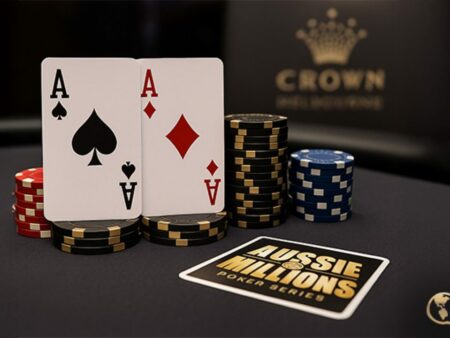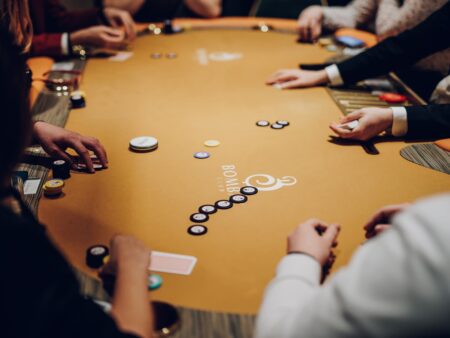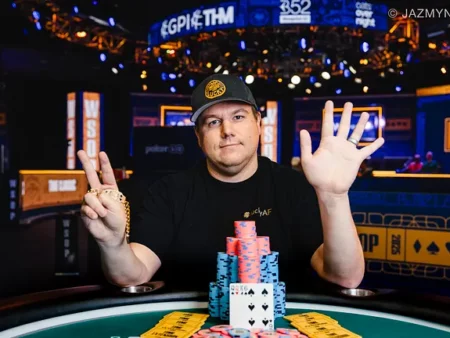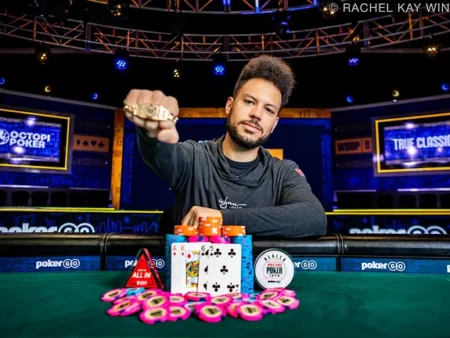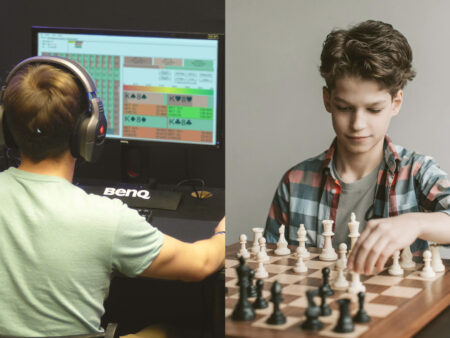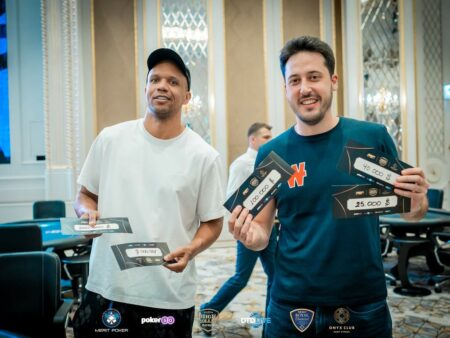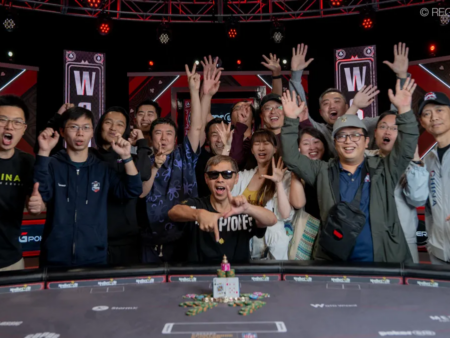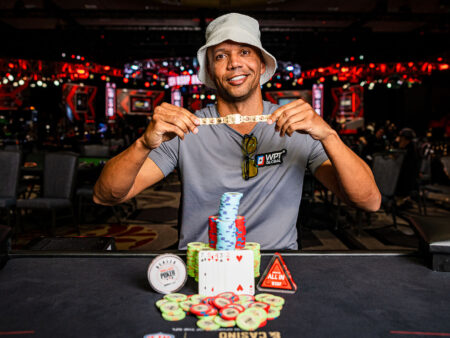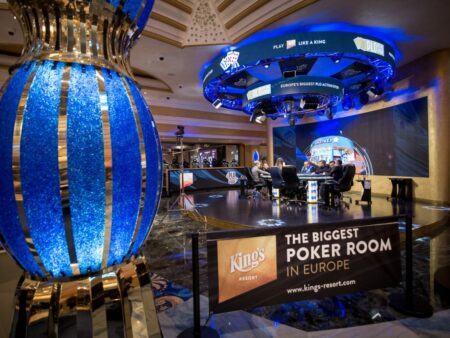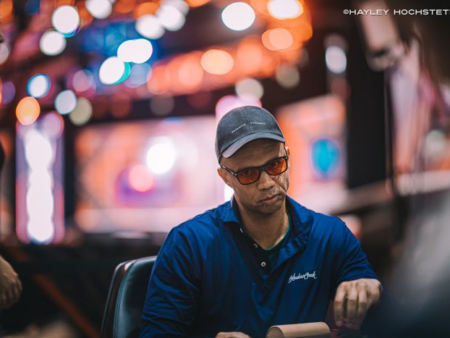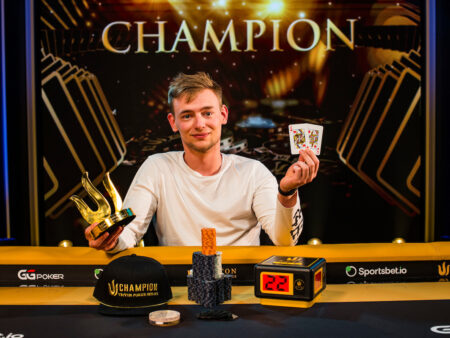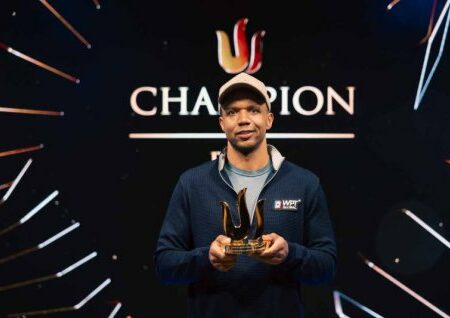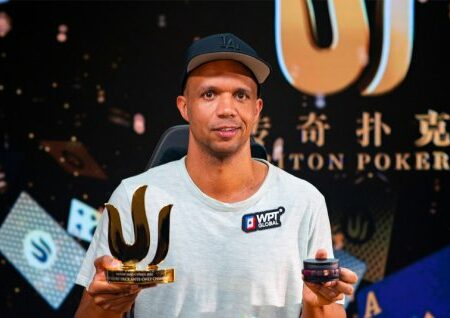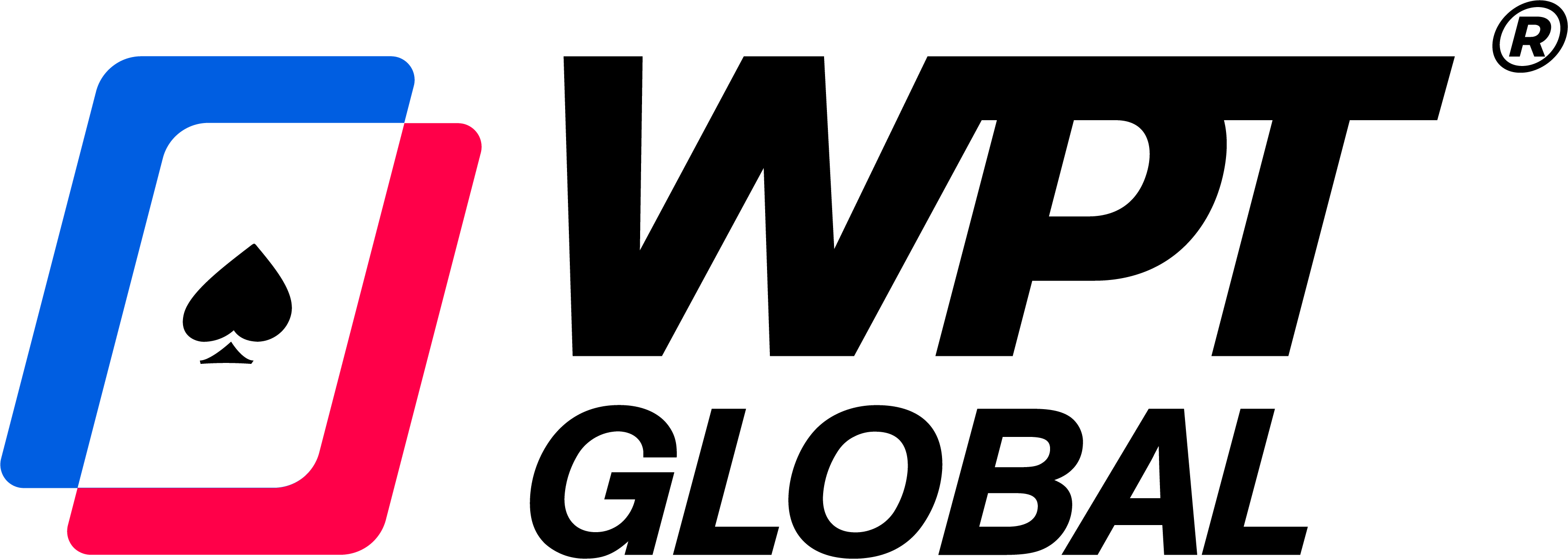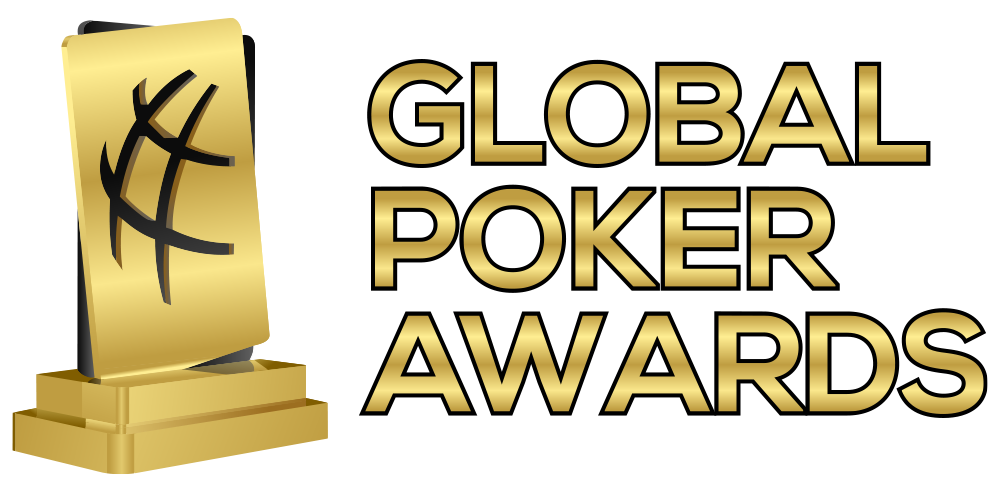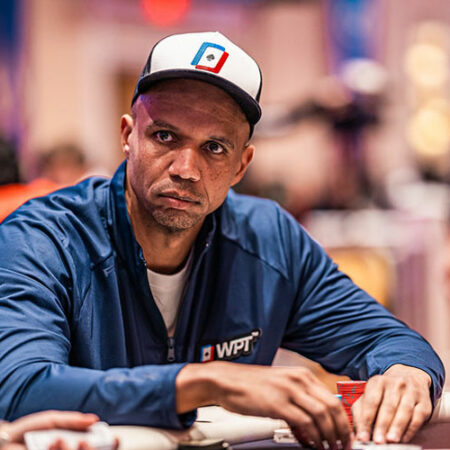
Phil Ivey
10
2
3
4
Early Life
Born on February 1, 1976, in Riverside, California, Phillip Dennis Ivey Jr. showed an early interest in poker. He started playing in local casinos, where he had to use a fake ID and play under his fake name, Jerome Graham, until he finally turned 21.
In his early years, Ivey was named “The Phenom” as he showed remarkable skill and progressed rapidly from low stakes to the world’s highest stakes games.
Ivey had the unique ability to stay calm under pressure with a natural talent for outplaying opponents in the most challenging situations.
He was awarded a new nickname, “The Tiger Woods of Poker,” not just because of his similar physical appearance to the golf star but also for his dominance at the poker tables.
Success in World Series of Poker
One of the highlights of Ivey’s career is his remarkable success in high-stakes tournaments. He has an impressive list of results, including ten World Series of Poker (WSOP) bracelets, placing him on the list of most prominent players. The variety of wins in different kinds of poker shows his ability to learn and adapt faster than others.
His first WSOP win came in 2000 when he won a $2,500 PLO event for $195,000 and his first World Series of Poker bracelet.
It didn’t take long for Ivey to add more bracelets to his collection. He returned to WSOP in 2002. and won three more bracelets for a total of around $350,000.
Ivey continued to play in WSOP every year until 2009. he had a deep run in the WSOP No Limit Hold’em Main event, where he reached the final table and finished in 7. place out of 6,494 participants and got his biggest-ever WSOP payout of $1.4 million. In the same year, he also won two more WSOP bracelets.
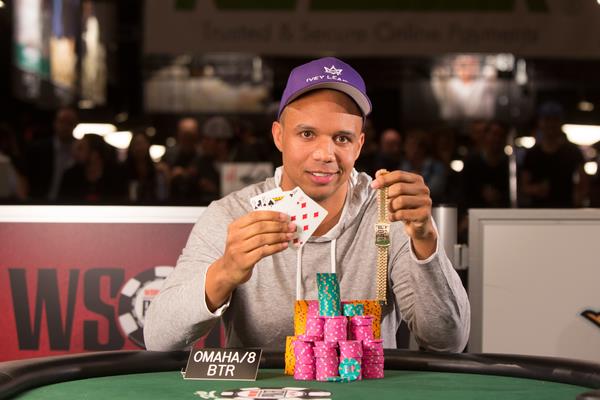
Ivey is currently 2nd in the All-time WSOP bracelet list with his ten bracelet wins, just behind Phil Hellmuth, who has 17.
He was also the youngest to win ten WSOP bracelets, as he was 38 years old in 2014 when he won his last bracelet.
Phil Ivey’s WSOP Bracelet Wins
| Year | Event | Place | Prize |
|---|---|---|---|
| 2000 | $2,500 Pot Limit Omaha | 1st | $195,000 |
| 2002 | $1,500 7 Card Stud | 1st | $132,000 |
| 2002 | $2,500 7 Card Stud Hi-Lo | 1st | $118,440 |
| 2002 | $2,000 Limit S.H.O.E. | 1st | $107,540 |
| 2005 | $5,000 Pot Limit Omaha | 1st | $635,603 |
| 2009 | $2,500 Omaha/Seven Card Stud Hi-Lo | 1st | $220,538 |
| 2009 | $2,500 No Limit Deuce to Seven Draw | 1st | $96,367 |
| 2010 | $3,000 H.O.R.S.E. | 1st | $329,840 |
| 2013 | A$2,200 Mixed Event | 1st | A$51,840 |
| 2014 | $1,500 8-Game Mix | 1st | $166,986 |
World Poker Tour
His first WPT cash was in 2002, where he finished in 4th place for $75,650 in a $10,000 No Limit Hold’em Main Event.
In 2003, he won 2nd place in another $10,000 No Limit Hold’em event, but this time for $290,130. In the same year, he continued with two wins and 3rd place in the Main Event for a total of $668,000 in winnings for 2003.
Ivey’s first WPT title came in 2008 when he won the $10,000 No Limit Hold’em – Championship Event(L.A. Poker Classic) for $1.6 million. His total WPT earnings go over $4 million.
Phil Ivey’s Top 5 WPT Results
| Year | Event | Place | Prize |
|---|---|---|---|
| 2008 | L.A. Poker Classic $9,900 Championship | 1st | $ 1,596,100 |
| 2016 | Triton Super High Roller Series – Cali Cup | 5th | $656,500 |
| 2021 | WPT Heads Up Poker Championship | 1st | $400,000 |
| 2010 | Bellagio Cup VI $10,000 Championship | 3rd | $363,650 |
| 2003 | Jack Binion World Poker Open $10,000 Championship | 2nd | $290,130 |
European Poker Tour Debut
If we exclude Monte Carlo, we couldn’t see much of Phil Ivey playing poker in Europe, but then, in 2006, he had a debut in the EPT Barcelona Main Event and won 2nd place for $470,006.
His other two cashes in EPT were EPT London £5,000 Main Event/UKIPT Grand Final for $20,343 and Grand Final, Monte Carlo €25,000 8 Max High Roller for $96,642.
Phil Ivey’s Top 3 EPT Results
| Year | Event | Place | Prize |
|---|---|---|---|
| 2006 | Barcelona Open €4,800 Main Event | 2nd | € 371,000 |
| 2012 | Grand Final, Monte Carlo €25,000 8 Max High Roller | 9th | €73,200 |
| 2010 | London £5,000 Main Event/UKIPT Grand Final | 59th | £13,000 |
Aussie Millions Poker Championship
His first Aussie Millions win came in 2012 when he won 2012. Aussie Millions Poker Championship with a buy-in of $250,000 and only 16 contestants.
Ivey came on top, beating the likes of Patrik Antonius and Gus Hansen, who placed 2nd and 3rd. Ivey got $2.06 million for his win. He won the same event in 2014. for $3,58 million and in 2015. for $1,71 million.
Phil Ivey’s Top 5 Aussie Millions Results
| Date | Event | Place | Prize |
|---|---|---|---|
| February 2014 | A$250,000 No Limit Hold’em – $250,000 Challenge | 1st | A$4,000,000 ($3,582,753) |
| February 2012 | A$250,000 No Limit Hold’em – $250,000 Challenge | 1st | A$2,000,000 ($2,058,948) |
| February 2015 | A$250,000 No Limit Hold’em – $250,000 Challenge | 1st | A$2,205,000 ($1,710,854) |
| January 2010 | A$100,000 + 500 $100,000 Challenge | 2nd | A$600,000 ($553,776) |
| January 2012 | A$10,000 + 600 No Limit Hold’em – Main Event | 12th | A$100,000 ($ 102,947) |
Triton Poker
Ivey had his first Triton Poker cash in 2022. where he came in 4th place in the $50,000 No Limit Hold’em event and won $387,100.
After that, he had 5th,2nd, and two 1st places in one week for a total of around $2.9 million. He returned to Triton the same year and got 1st and 4th place for an additional $568,000.
In 2023. Triton Poker Super High Roller Series were his last live cashes. First, in London, he got four cashes, including two 1st places, 2nd place, and one 6th place, for total winnings of around $2 million.
- Read about Phil Ivey’s Triton London Triumph
Lastly, he closed the year with two cashes in Monte Carlo, one in 8th place and one in 28th place, for $410,000.
Phil Ivey’s Triton Poker Results
| Year | Event | Place | Prize |
| 2022 | $ 50,000 No Limit Hold’em | 4th | $387,100 |
| 2022 | $ 50,000 No Limit Hold’em – 8-Handed Turbo | 5th | $179,000 |
| 2022 | $ 75,000 No Limit Short Deck Hold’em | 1st | $1,170,000 |
| 2022 | $ 30,000 No Limit Short Deck Hold’em | 1st | $387,000 |
| 2022 | $ 50,000 No Limit Short Deck Hold’em | 4th | $181,784 |
| 2023 | $ 20,000 + 2,400 + 20,000 No Limit Hold’em – Mystery Bounty 7-Handed | 2nd | $434,900 |
| 2023 | $ 60,000 + 3,600 No Limit Hold’em – 7-Handed | 6th | $363,000 |
| 2023 | $ 60,000 + 2,400 No Limit Hold’em – Turbo | 1st | $1,007,000 |
| 2023 | $ 25,000 + 1,500 No Limit Short Deck Hold’em | 1st | $280,500 |
| 2023 | $ 100,000 + 6,000 No Limit Hold’em – 8-Handed | 8th | $372,000 |
| 2023 | $ 25,000 + 1,650 No Limit Hold’em – GG MILLION$ Live 8-Handed | 28zh | $41,000 |
Cash Games
Ivey regularly participates in the high-stakes $4,000–$8,000 mixed cash game at the Bellagio in Las Vegas, famously known as the Big Game.
In February 2006, he engaged in a high-stakes heads-up Limit Texas Hold’em battle against Texas billionaire Andy Beal. The stakes soared to $25,000/$50,000 and $50,000/$100,000.
Over three intense days at The Wynn Resort, Ivey had a big win, pocketing over $16,000,000. Notably, Ivey represented “The Corporation,” a group of top-tier poker professionals who pooled their resources and rotated in challenging Beal.
Before this triumph, Beal had dealt a significant blow to the Corporation, winning over $13,000,000 earlier in the month.
While Ivey’s cash game skills have earned him enormous wealth and reputation, they have also underscored the unpredictable nature of poker. Despite his talent and experience, Ivey has faced setbacks and challenges along the way, reinforcing the notion that even the greatest players are not immune to the inherent variance of the game.
One of the most thrilling moments in the history of high-stakes poker occurred when two legends of the game, Phil Ivey and Tom Dwan, clashed in a monumental pot worth a staggering $1.1 million.
Both players had a gutshot on the flop, and the turn gave them both a straight, but Dwan had “the nuts”. All the money went in on the turn, and Ivey saw that he was drawing dead in the biggest televised pot; he just said, “Wow, good hand.
Full Tilt Poker Sponsorship
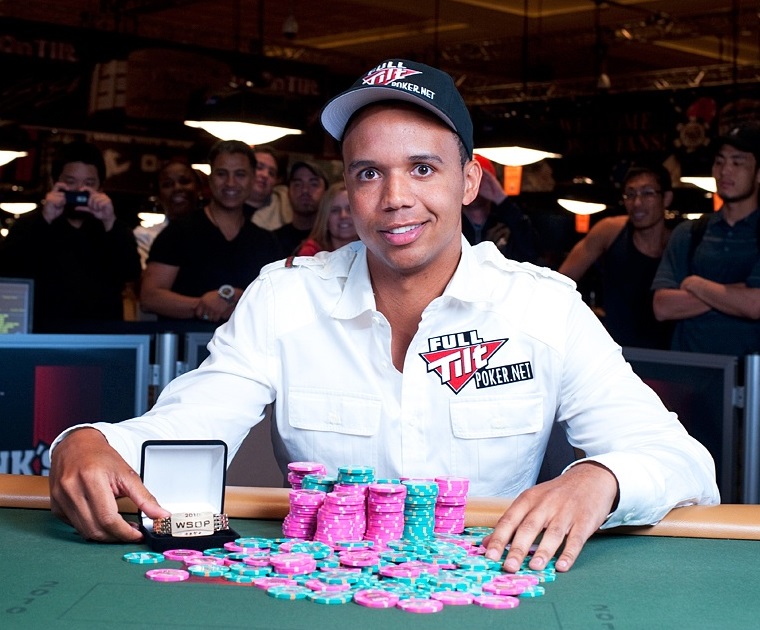
Ivey was one of the founders of Full Tilt Poker and one of the world’s most recognizable and successful poker players. His connection to the brand added prestige and credibility to the site.
Ivey’s affiliation with Full Tilt Poker went beyond mere sponsorship; he was also a shareholder in the company.
However, he got caught in controversy for being connected to the site when events surrounding Black Friday in 2011 occurred.
Full Tilt Poker ended up in legal and financial problems, and the site operations were suspended, with players’ accounts frozen.
It was later revealed that Full Tilt Poker had been operating as a massive Ponzi scheme, with funds belonging to players being used to pay off executives and cover operational expenses.
Phil Ivey’s reputation suffered from the Full Tilt Poker scandal. As a prominent figure associated with the site, he faced criticism and scrutiny from the poker community and the public.
More of the Controversy
Phil Ivey’s edge sorting scandal is a controversial topic that sparked lots of debates and interest within the community.
Edge sorting is a technique used by players where they can identify tiny imperfections in the patterns of the playing cards.
Players can exploit the imperfections to gain information about the card and improve their odds of winning.
One of the most known incidents involving Phil Ivey and edge sorting occurred in 2012 at the Crockfords Casino in London.
Ivey and accomplice Cheung Yin Sun engaged in a session of punto banco, a baccarat variant using edge sorting techniques; they were able to identify minute discrepancies in the patterns on the back of the cards, enabling them to determine whether the next card to be dealt was likely to be favorable or unfavorable.
Throughout several sessions, Ivey and Sun won approximately £7.7 million from Crockford Casino using their edge-sorting strategy.
However, when the casino discovered the nature of their tactics, they refused to pay out the winnings, alleging that Ivey and Sun had engaged in cheating.
Ivey and Sun did the same thing at the Borgata Hotel Casino & Spa in Atlantic City, winning approximately $9.6 million. However, the casino refused to pay the winnings, leading to a lengthy legal battle.
In 2016, a federal judge ruled in favor of the Borgata, ordering Phil Ivey to repay the $9.6 million he had won, plus an additional $504,000 in earnings from his edge sorting scheme.
The judge determined that Ivey’s actions constituted a breach of contract and violated New Jersey’s Casino Control Act.
